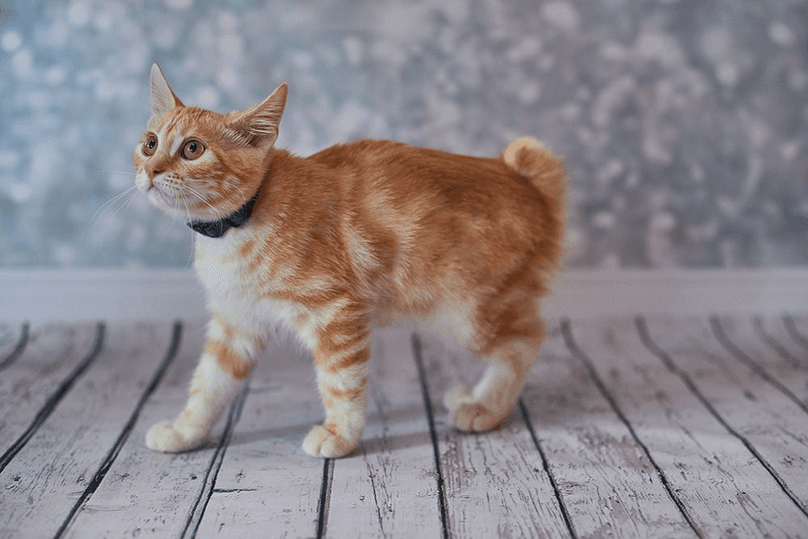
Looking for an eye-catching cat that’s a playful cuddler? The American bobtail may be the purr-fect feline for you! Known for their snub tails, stout stature, thick fur, and overall rugged appearance, bobtail cats have become a favorite of pet owners over the last 50 years.
Like another familiar tailless breed, the Manx, the American bobtail is somewhat uncommon, often fetching higher purchase prices (typically $600–$1200 per animal) compared with other domestic breeds. Despite the cost, however, bobtails are quite desirable because of their gentle character, adaptability, and intelligence.
Cat Breed History: American Bobtail
The story of the American bobtail began in the 1960s with naturally occurring bobtail cats, rather than with a pedigree. As it happened, a vacationing couple adopted a feral bobtail while on holiday in Arizona and allowed it to mate with their domestic shorthair back in Iowa, which produced a litter of bobtail kittens. Professional breeders picked up the trend, and by further cross-breeding of naturally occurring bobtail cats, were able to use the cats’ broad genetic profile to refine the breed standard. The result is a cat with a wild, rugged appearance but a gentle temperament.
Characteristics of the American Bobtail Cat
Physical Characteristics. The American Bobtail is a stout cat with medium-length fur and a stub tail. Males typically weigh between 14 and 17 pounds, with females running slightly smaller. They range in height from 10”-12” and from 12” to 20” in length. Bobtails have round faces with pronounced whisker pads and a strong chin. Their wide-set eyes can be any color, from ice blue to sunset gold!
Bobtails have thick fur, which can be nearly any color, owing to the breed’s broad genetic profile. As for the tail itself, no two bobtails are exactly alike. In some, the tail is straight, while in others it may be curved, and its length ranges from a nub to about one-third that of a domestic shorthair. The Bobtail’s body is sturdy, with the rear legs being slightly longer than the front, with large round feet with toe tufts. The animal’s overall appearance recalls its larger, wild cousin the bobcat.
Behavioral Characteristics.Despite the American bobtail’s wilderness appearance, the breed is known for its agreeable temperament. American bobtails are described as being:
- Good with children
- Good with other pets
- Easily handled and picked up
- Excellent lap cats
- Intelligent problem-solvers
- Great companions
Owners have described the bobtail’s personality as loyal and dog-like, making them an excellent choice for families, elders, and first-time cat owners. And if you like a chatty cat, the American Bobtail is a vocal breed that’s not afraid to let you know what it likes.
Health Issues.A naturally robust and healthy breed, the American Bobtail lacks many of the health problems that can affect narrower pedigrees. There are, however, a few issues to watch:
- Weight gain and obesity can become problematic and may have a negative impact on your pet’s overall health. If your bobtail shows signs of unhealthy weight gain, consult your vet about a healthy weight-maintenance diet regimen. (Chronic overweight in cats can contribute to feline diabetes, cardiovascular issues, and orthopedic problems.)
- Tooth decay and dental problems have also been associated with the breed, so it’s advisable to have your bobtail’s teeth cleaned regularly. Your vet can advise you about between-cleaning home dental care for your pet.
- Hip problems, while not common, can occur due to the breed’s unusual stature. Your vet can perform a physical exam and imaging studies to determine the severity of any defect.
- Fur matting is a potential risk in longer-haired cats, so it’s important to maintain a regular brushing routine (2 or 3 times weekly) to prevent matts, remove dander, and to keep the underlying skin healthy.
Adopting an American Bobtail
The American Bobtail is among the most adoptable of domestic breeds. Their dog-like personality makes them excellent home companions, and their gentle nature allows them to blend in well among children and other pets. Known for their intelligence, bobtails will quickly learn litter manners and house rules. They make good outdoor pets, and enjoy toys and games indoors. Bobtails will often initiate play with their human companions, so if you’re looking for an engaged animal that bonds easily with people, the Bobtail may be ideal!
Did You Know? Bobtails stay kittens longer than most cats! Slow to mature, bobtails often require 2-3 years to reach their full mature size and weight.